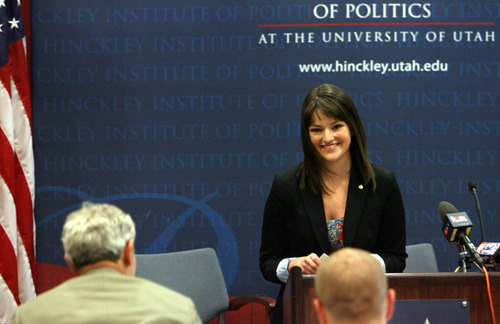This is an archived article that was published on sltrib.com in 2012, and information in the article may be outdated. It is provided only for personal research purposes and may not be reprinted.
University of Utah honors students admittedly have an agenda: They want government to be more open about its agendas.
In fact, they want the state's 270-plus cities and counties to be more transparent about all their policies and practices.
So, on Wednesday, the U.'s Honors College Think Tank unveiled a set of "transparency best practices" that will be sent to local governments statewide.
"We believe through simple and cost-effective ways our local governments can vastly improve their transparency," sophomore Tanner Gould said. "These processes could have a profound effect if adopted. We urge Utah's local governments to take these to heart and try to make Utah a better place to live."
The students recommend that governments have an online database of all public information, including third-party contracts, employee compensation and financial reports. Public officials also should consider all electronic communications made with government equipment to be public records, the think tank said. Other recommendations include streaming public meetings online and providing opportunities for citizen comments on the Web.
Alex Boren, another Think Tank student, said adopting such practices would increase public trust, satisfaction and civic engagement.
"One of the reasons why we have focused on local government," the 20-year-old sophomore said, "is they are closest to the community and can have the greatest impact."
The Salt Lake Tribune was a community partner in the Think Tank class. A managing editor provided editing assistance for the final report the class will produce. The newspaper also paid for a poll of questions written by students exploring citizen opinions about online access to government information.
Salt Lake City Mayor Ralph Becker and City Council Chairman Soren Simonsen spoke at Wednesday's launch and praised the students' work.
Simonsen said he's excited about the progress the city has made under its own transparency initiative, but added that the effort remains "a work in progress."
In an interview, Becker said he's encouraged that students are paying attention to how governments conduct the public's business.
"My sense is that local governments, city governments particularly, are going to be very responsive and look for ways to improve," Becker said. "It's not going to hurt at all to have people pressing them and looking at what they're doing and making specific suggestions."
'Best Practices' for local government transparency
Students in the University of Utah's Honors Think Tank on Transparency and Privacy are urging local governments to do the following:
» Establish a single "open government" Web page that serves as a "searchable, sortable and downloadable" repository for all public government information, including third-party contracts, employee compensation, financial reports and requests for police and fire service.
» Collect, generate and maintain government information in digital form and make it available on the open-government Web page.
» Consider emails, instant messages and other electronic communications made with government-supplied equipment to be public records.
» Require elected officials and appointed senior administrators to post advance schedules of public meetings online and to commit to developing a culture of transparency.
» Make all public meetings truly transparent, through live streaming on the Internet (with opportunities for citizen commentary online) or posting of proceedings on the website within 48 hours of the meeting.
• To learn more about the project, go to http://www.utahtransparencyproject.org. —
'Best' policies
O Students in the University of Utah's Honors Think Tank on Transparency and Privacy suggest ways for open government. › sltrib.com



